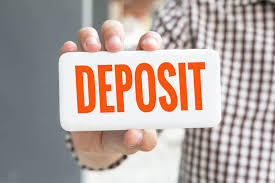- Home
- Questions and Answers
- Security Deposits
Customer Deposit Bookkeeping Question
by MKMK
(HK)
Our company rents out some store rooms to our customers. The customers are required to place some deposits upon commencement of the lease and are expected to get back the deposits upon expiry of lease. How do I record these deposits?
In some cases, the customers may use part of the deposits to offset the rental. In this case, how can I record these transactions?
Comments for Customer Deposit Bookkeeping Question
|
||
|
||
Customer Deposit Account
For a deposit in a customer deposit account what account would be debited and what account would be credited?
Comments for Customer Deposit Account
|
||
|
||
Depositing a Check That Needs to Be Split 4 Ways
by Diana
(Glenwood Springs, CO USA)
My husband is in a band. I have a check for $400.00 that I need to deposit, then split with the 3 other band members. How do I record & write check so that we show only $100.00 in income & not $400.00?
Comments for Depositing a Check That Needs to Be Split 4 Ways
|
||
|
||
Deposits For New Assets
I wanted to clarify the proper way to post the deposits.
I am dealing with purchasing a new asset for a small corporation. The asset had to be ordered in advance and a deposit is required up front. Deposit was made in December 2022 and the asset will not be delivered until June 2023 (possession will be sometime in June 2023).
In this case, should I set up a new account for the asset and post the deposit to the asset account or should I set up a new account for prepaid deposits and post the deposits to that account?
Thank you for your assistance. Ann Marie
Comments for Deposits For New Assets
|
||
|
||
Old Deposit That Never Cleared
by Katrina Misthos
(San Francisco)
I have to deposits from previous years that have never cleared. I need to close the book for this year how do I get rid of them? Thanks
Comments for Old Deposit That Never Cleared
|
||
|
||
Quickbooks Deposits
by mmd
(Kingwood, TX)
When an owner puts a cash deposit from his own funds into his business account, how do you record that?
I show the Deposit:
From: "Owner"
Account Code: "Owner Draw: Expense
Is this correct or should there be an Income column for this type of transaction?
Comments for Quickbooks Deposits
|
||
|
||
Security Deposits
What type of account are security deposits
Comments for Security Deposits
|
||
|
||
Please subscribe to my monthly newsletter, Bookkeeping Basics E-zine. It tells you every month about the new information that I have added, including some great tips and advice from myself and other Bookkeeping Basics readers.
Like Bookkeeping-Basics.net?
- Home
- Questions and Answers
- Security Deposits













